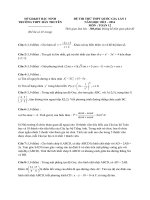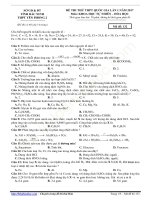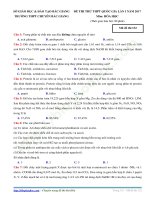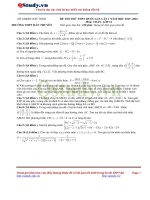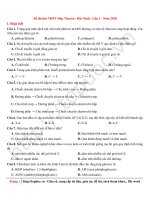Đề thi thử tiếng Anh THPTQG Hàn Thuyên Bắc Ninh lần 1 năm 2024
Bạn đang xem bản rút gọn của tài liệu. Xem và tải ngay bản đầy đủ của tài liệu tại đây (138.4 KB, 6 trang )
ĐỀ THI THỬ TỐT NGHIỆP THPT – NĂM HỌC 2023 - 2024
MÔN: TIẾNG ANH
TRƯỜNG THPT HÀN THUYÊN
SỞ GIÁO DỤC VÀ ĐÀO TẠO BẮC NINH
Thời gian làm bài: 60 phút, 50 câu hỏi trắc nghiệm
Mark the letter A, B, C or D on your answer sheet to indicate the word whose underlined part
differs from the other three in pronunciation in each of the following questions.
Question 1. A. heir
B. wear
C. weir
D. stare
Question 2. A. glacis
B. gingham
C. ginger
D. giggle
Mark the letter A, B, C, or D on your answer sheet to indicate the word OPPOSITE in meaning to
the underlined word in each of the following questions.
Question 3. Recent archaeological studies have shown that the first inhabitants of Russel Caverns
were Paleo Indians, who used the most rudimentary tools and objects for their survival.
A. basic
B. technical
C. original
D. superior
Question 4. Some successful scientists make their careers by hammering away at one experimental
technique that they are good at, and by gathering a gang of co – workers to do the donkey work.
A. hard and boring work
B. exciting and challenging work
C. exhausting and difficult work
D. interesting and simple work
Mark the letter A, B, C, or D on your answer sheet to indicate the correct answer to each of the
following questions.
Question 5. It was at the conference
the truth about his corporation.
A. where the director told
B. the director did tell
C. did the director tell
D. that the director told
Question 6. They
all my books by the time I come back in 2 years’ time.
A. have read
B. had read
C. will read
D. will have read
Question 7. What if I
you that there’s a good chance I can get tickets for the
concert?
A. have told
B. were telling
C. were to tell
D. would to tell
Question 8. He
nothing during the last few months because of his headache.
A. has done
B. did
C. had done
D. does
Question 9. Everyone in both cars
injured in the accident last night,
?
A. were / weren’t they B. were / were they C. was / weren’t they D. was / wasn’t he
Question 10.
passenger pigeon, one of several species of extinct birds, was
hunted to extinction over
few decades.
A. The / a
B. The / ∅
C. ∅ / the
D. A / The
Question 11. You should see a doctor; after such a blow to the head, you may be suffering from.
A. percussion
B. concussion
C. condition
D. perfusion
Question 12. The detective doesn’t think he’ll ever
all the missing money.
A. find for
B. stir up
C. rip off
D. track down
Question 13. He recalled
him outside the shop on the night of the robbery.
A. see
B. seeing
C. being seen
D. to see
Question 14. Of the two female students from Japan, Koko is
.
A. active
B. more active
C. the most active D. the more active
Question 15. The lake,
, was finally thawing.
A. be frozen over all winter
B. freezing over all winter
C. frozen over all winter
D. freeze over all winter
Question 16. I wouldn’t want my machine to
.
A. fall into the wrong hands
B. fall between the cracks
C. fall from graces
D. fall into line
Question 17. All four firefighters were decorated
bravery.
A. for
B. with
C. to
D. at
Question 18. It is announced that a group of climber has
in the Himalayas.
A. done missing
B. made missing
C. been missing
D. gone missing
Question 19. This room has been
as a non – smoking area.
A. designed
B. designated
C. destined
D. described
Mark the letter A, B, C, or D on your answer sheet to indicate the sentence that best completes
each of the following exchanges.
Question 20. Ken and Laura are saying goodbye to each other after going to LOTTE Center. And
they are going to have a date with each other later.
- Laura: "Well, it's getting late. Maybe we could get together sometime."
- Ken: “
”
A. Nice to see back you.
B. Take it easy.
C. Yes, I’ve enjoyed it.
D. Sounds good. I’ll give you a call.
Question 21. - Thanks a lot for a lovely dinner. Bye!
-“
”
A. Safe and sound!
B. You will be welcome!
C. Never mind!
D. You must come again!
Mark the letter A, B, C, or D to indicate the sentence that best combines each pair of sentences in
the following questions.
Question 22. The student was very bright. He could solve all the math problem.
A. So bright was the student that he could solve all the math problems.
B. The student was very bright that he could solve all the math problems.
C. He was such bright student that he could solve all the math problems.
D. Such bright was the student that he could solve all the math problems.
Question 23. He gets bad marks in the final exams because of his laziness.
A. He wishes he had better learned hard for his final exams.
B. He wishes he would learn hard for his final exams.
C. He wishes he had learned hard for his final exams.
D. He wishes he learned hard for his final exams.
Mark the letter A, B, C or D on your answer sheet to indicate the word that differs from the other
three in the position of the primary stress in each in each of the following questions.
Question 24. A. smartphone B. access
C. device
D. newspaper
Question 25. A. elector
B. sharpener
C. carpenter
D. astronaut
Mark the letter A, B, C, or D on your answer sheet to indicate the word (s) CLOSEST in meaning
to the underlined word (s) in each of the following questions.
Question 26. One of the aims of most Lay Organizations is to disseminate knowledge about
Huntington's disease to local doctors, social workers and nursing homes.
A. compile
B. condense
C. dedicate
D. disperse
Question 27. Since I had no recourse to take this route, I took the stories with a pinch of salt and
never checked them out.
A. paid no attention to the stories
B. believed only part of the stories
C. didn’t believe anything in the stories
D. believed the whole stories
Read the following passage and mark the letter A, B, C, or D on your answer sheet to indicate the
correct answer to each of the questions.
An air pollutant is defined as a compound added directly or indirectly by humans to the
atmosphere in such quantities as to affect humans, animals, vegetation, or materials adversely. Air
pollution requires a very flexible definition that permits continuous changes. When the first air
pollution laws were established in England in the fourteenth century, air pollutants were limited to
compounds that could be seen or smelled - a far cry from the extensive list of harmful substances
known today. As technology has developed and knowledge of health aspects of various chemicals
has increased, the list of air pollutants has lengthenend. In the future, even water vapor might be
considered an air pollutant under certain conditions.
Many of more important air pollutants, such as sulfur oxides, carbon monoxides and nitrogen
oxides are found in nature. As the Earth developed, the concentration of these pollutants was altered
by various chemical reactions; they became components in biogeochemical cycles. These serve as
an air purification scheme by allowing the compounds to move from the air to the water or soil. On
a global basis, nature's output of these compounds dwarfs that resulting from human activities.
However, human production usually occurs in a localized area, such as a city. In such region,
human output may be dominant and may temporarily overload the natural purification scheme of
the cycles. The result is an concentration of noxious chemicals in the air. The concentrations at
which the adverse effects appear will be greater than the concentrations that the pollutants would
have in the absence of human activities. The actual concentration need not be large for a substance
to be a pollutant; in fact, the numerical value tells us little until we know how much of an increase
this represents over the concentration that would occur naturally in the area. For example, sulfur
dioxide has detectable health effects at 0.08 parts per million (ppm), which is about 400 times its
natural level. Carbon monoxide, however has a natural level of 0.1 ppm and is not usually a
pollutant until its level reaches about 15 ppm.
Question 28. What does the passage mainly discuss?
A. What constitutes an air pollutant
B. The effects of compounds added to the atmosphere.
C. How much harm air pollutants can cause.
D. The economic impact of air pollution.
Question 29. The word “These” in paragraph 2 is closest in meaning to
.
A. the compounds moved to the water or soil
B. the components in biogeochemical cycles
C. the pollutants from the developing Earth
D. the various chemical reactions
Question 30. For which of the following reasons can natural pollutants play an important role in
controlling air pollution?
A. They have existed since the Earth developed.
B. They occur in greater quantities than other pollutants.
C. They are less harmful to living beings than other pollutants.
D. They function as part of a purification process.
Question 31. According to the passage, human – generated air pollution in localized regions
.
A. will damage area outside of the localized regions.
B. can be dwarfed by nature's output of pollutants.
C. can overwhelm the natural system removing pollutants.
D. will react harmfully with natural pollutants.
Question 32. According to the passage, the numerical value of the concentration level of a
substance is only useful if
.
A. it can be calculated quickly
B. the natural level is also known
C. the other substances in the area are known
D. it is in a localized area
Question 33. The word “detectable” in paragraph 3 is closest in meaning to
.
A. beneficial
B. special
C. seperable
D. measurable
Question 34. Which of the following is best supported by the passage?
A. Scientists should be consulted in order to establish uniform limits for all air pollutants.
B. To effectively control pollution, local government should regularly review their air pollution
laws.
C. One of the most important steps in preserving natural lands is to better enforce air pollution laws.
D. Human activities have been effective in reducing air pollution
Mark the letter A, B, C, or D on your answer sheet to indicate the sentence that is closest in
meaning to each of the following questions.
Question 35. It is said that many people were homeless after the floods.
A. Many people are said to be homeless after the floods.
B. Many people are said to have been homeless after the floods.
C. Many people say that they are homeless after the floods.
D. Many people said that they were homeless after the floods..
Question 36. At the party last night he talked about nothing but the weather.
A. He had nothing to say about the weather at the party last night.
B. His sole topic of conversation at the party last night was the weather.
C. He talked about everything including the weather at the party last night.
D. He said he had no interest in the weather at the party last night.
Question 37. “What happened in London in 1950?”, the student asked the teacher.
A. The student asked the teacher what had happened in London in 1950.
B. The student asked the teacher to tell him what happens in London in 1950.
C. The student asked the teacher for what happened in London in 1950.
D. The student asked the teacher what happened in London in 1950.
Read the following passage and mark the letter A, B, C, or D on your answer sheet to indicate the
correct answer to each of the questions.
A major American bank is being sued by the US authorities for allegedly discriminating
against its female employees. It has been alleged that women in the firm do not have as good
promotion prospects as the men and that their salaries are not on a par with those of their male
counterparts.
Sexism in the workplace is against the law in America and in many other countries. However,
there are still obstacles in many firms which prevent women from achieving the promotion that
their talents and qualifications deserve. Many women are promoted quite rapidly through the junior
jobs in a firm, but face the glass ceiling, when they apply for any of the most senior posts. So it is
that, although there are many women in middle management positions in many firms, there are very
few in top management posts.
Many women blame this situation on the old – boy network. Others see it as evidence that
many men are resistant to change and are still chauvinist at heart, while some may feel that failure
to promote women to top jobs is a result of feelings of insecurity in the men who are making the
appointments. Perhaps they are afraid of letting women become too powerful.
Not many years ago the power which women have today would have seemed an impossible
dream to many women. Before the rise of the women’s movement there were no such things as
equal rights or equal opportunities for women. For the most part, women were expected to get
married and then be responsible for childcare and for carrying out all the household tasks. If they
worked, it was probably in a part-time, often rather menial job.
Feminists saw this as sexism and a waste of women’s talents, and set out to change things.
Although some people, women as well as men, now do not have a high regard for feminism, women
owe to feminists many of the improvements in their work situation. Without them, there would be
no positive discrimination, no job-sharing and no parity with men in the workplace.
Question 38. What could be the best title of the passage?
A. Gender discrimination B. Men and Women C. Jobs for Women D. Sex Equality
Question 39. The phrase “on a par with” as used in the first paragraph can be best replaced by .
A. equal to
B. compared with
C. better than
D. so low as
Question 40. Which of the following is NOT mentioned as a reason for sexism at the
workplace?
A. The old – boy network.
B. Male chauvinism.
C. Women’s weakness.
D. Men’s feeling of insecurity.
Question 41. The word “this” in the last paragraph refers to the fact that women
A. were expected to get married and give birth to children.
B. fought for equal rights and equal opportunities.
C. wasted their talents and time doing unimportant jobs.
D. could not do full – time job, just household chores.
Question 42. It can be inferred from the paragraph that
.
A. women’s current tasks include taking care of children and doing housework.
B. having power is still an impossible dream for many women nowadays.
C. since the women’s liberation movement, women have had equal opportunities.
D. women in the past could not do any jobs whether they were part – time or menial.
Read the following passage and mark the letter A, B, C, or D on your answer sheet to correct
word or phrase that best fits each of the numbered blanks.
Global warming could cause drought and possibly famine in China, the source of much of
Hong Kong’s food, by 2050, a new report predicts. Hong Kong could also be (43) from flooding
as sea levels rose. The report recommends building sea-walls around low-lying areas such as the
new port and airport reclamations. Published by the World Wide Fund for Nature (WWF), the
report, (44) includes work by members of the Chinese Academy of Meteorological Sciences, uses
the most recent projections on climate change to point to a gloomy outlook for China. By 2050,
about 30 to 40 per cent of the country will experience changes in the type of vegetation it supports,
with tropical and subtropical forest conditions shifting northward and hot desert conditions rising
in the
west where currently the desert is temperate. Crop-growing areas will expand (45)
any
benefit is expected to be negated by increased evaporation of moisture, making it too dry to grow
crops such as rice. The growing season is also expected to (46)
, becoming shorter in
southern and central China, the mainland’s breadbasket. The rapid changes make (47) unlikely
that plants could adapt.
Question 43. A. at risk
B. at it again
C. at a loss
D. at random
Question 44. A. which
B. where
C. what
D. when
Question 45. A. however
B. but
C. because
D. although
Question 46. A. remain
B. rotate
C. alter
D. reshape
Question 47. A. us
B. you
C. them
D. it
Mark the letter A, B, C or D to indicate the underlined part that needs correction in each of the
following questions.
Question 48. Last week Mark told me that he got very bored with his present job and
A
B
is looking for a new one.
C
D
Question 49. Such rapid alternatives of mood are some of the features of her writing.
A
B
C
D
Question 50. New laws should be introduced to reduce the number of traffic in the city center.
A
B
C
D

